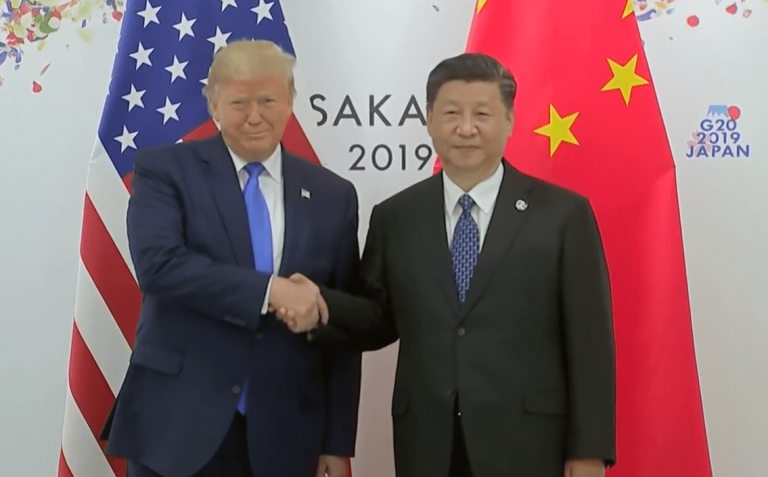The highly anticipated meeting in Japan between the presidents of the world’s two most powerful countries has yielded a new truce in the U.S.-China trade war, boosting optimism about the two leaders’ shared desire for an agreement.
Presidents Donald Trump and Xi Jinping met on the sidelines of the G-20 Summit in Osaka, Japan, on June 29, following multiple rounds of trade talks in Washington and Beijing that abruptly broke down over a month ago.
Trump said that the Osaka meeting had gone “even better than [he had] expected,” and that the talks were “back on track.” He announced that he would delay imposing new tariffs on Chinese goods, and let up on some restrictions targeting China’s flagship telecommunications company, Huawei, to facilitate future negotiations.
Xi, speaking in more scripted terms, stated that both countries stood to benefit from increased cooperation. Despite “enormous change” in international affairs, “China and the United States both benefit from cooperation and lose in a confrontation,” he said.
“Recently, Mr. President, you and I have stayed in close communication through phone calls and exchange of letters,” Xi said via an interpreter. He expressed his willingness to exchange views on “fundamental issues concerning the growth of U.S.-China relations.”
Success
You are now signed up for our newsletter
Success
Check your email to complete sign up
The Trump administration began imposing tariffs on China in the spring of 2018, beginning a trade war over what the U.S. government has called unfair and exploitative business practices on the part of Beijing. In December 2018, Xi and Trump met at the previous G-20 Summit in Argentina, where the presidents agreed to a 90-day trade truce.

President Donald Trump and First Lady Melania Trump pose for a photo with Chinese President Xi Jingping and his wife, Peng Liyuan, on Thursday, April 6, 2017, at the entrance of Mar-a-Lago in Palm Beach, Fl. (Image: Official White Photo by D. Myles Cullen)
In early May, Chinese negotiators suddenly backtracked on most of the terms they had worked out over multiple drafts of the trade deal, prompting Washington to raise tariffs again.
“I actually think that we were very close. And then … something happened where it slipped a little bit,” Trump said in Osaka, referring to the breakdown in talks.
The United States currently imposes a 25 percent tariff on US$250 billion of Chinese exports.
Though he re-affirmed his “excellent relationship” with Xi, Trump said he was not currently planning to reduce tariffs. “We want to do something that will even it up with respect to trade. I think it’s something that’s actually very easy to do,” Trump said at the press conference.
Renewed negotiations and obstacles
The hang-ups in negotiations between the Xi and Trump administrations, as well as Sino-U.S. trade relations in general, stem in large part from the nature of domestic politics in both countries. However, the opaque theatre of the Chinese Communist Party leaves Xi far less room to maneuver than his counterpart in the White House.
Xi has consistently signaled his willingness to attempt a deal with the United States, but his claim to legitimacy as head of the Communist Party hinges on his ability to remain in line with Party orthodoxy.
Unlike a democratically elected leader, whose authority rests with popular opinion and legal institutions, Xi instead has relied on a far-left ideological stance to consolidate power over rivaling factions in the CCP.

Xi has relied on a far-left ideological stance to consolidate power over rivaling factions in the CCP. (Image: File Photo)
The Sino-U.S. trade war has seriously interfered with the Communist Party’s efforts at economic and geopolitical expansion, as well as the vested interests of its elite membership. This has engendered belligerent anti-U.S. themes in state propaganda, including criticism of anyone who dares to go “soft” in negotiations with Washington.
SinoInsider, a political risk consultancy specializing in the analysis of Chinese political infighting and its impact on the country’s domestic and foreign affairs, believes that political rivals of Xi Jinping have ample opportunity to “weaponize” Party orthodoxy against him, edging him into politically correct, but pragmatically disastrous, decision-making.
Such “weaponization” may have sabotaged the Sino-U.S. negotiations in May. At a congressional hearing, U.S. Trade representative Robert Lighthizer said that “some forces in China decided” that the trade talks “went out beyond their mandate” in making concessions to Washington.
Michael Pillsbury, a scholar known for his book Hundred-Year Marathon: China’s Secret Strategy to Replace America as the Global Superpower, as well as his position as a China adviser to Trump, said that “President Xi has got politics” at home and has to “play to the Maoists” and “powerful hawks in China.”
According to SinoInsider, it is unlikely, if not impossible, for Xi to make effective progress in relations with the United States due to the ideological constraints of the Communist Party and the reality of factional struggle.
Meanwhile, the specter of increased tariffs looms, while the United States continues “to pressure the Chinese regime on the Hong Kong issue and on human rights.”
Like this article? Subscribe to our weekly email for more!














